Question 1
Who was the leader of the Patriots during the Revoluntionary War?
General George Washington
Question 2
In May of 1780, the British laid siege to Charleston. How did this impact the war effort?
Responses
- A The British blockaded Charleston Harbor, cutting off supply linesThe British blockaded Charleston Harbor, cutting off supply lines
- B Loyalist civilians launched guerilla attacks on Patriots in Charleston.Loyalist civilians launched guerilla attacks on Patriots in Charleston.
- C The British arrested and executed numerous Patriots in Charleston for treason.The British arrested and executed numerous Patriots in Charleston for treason.
- D Patriot forces put all of their effort into liberating South Carolina from the British.Patriot forces put all of their effort into liberating South Carolina from the British.
A The British blockaded Charleston Harbor, cutting off supply lines.
Question 3
Who fought against the British colonists in South Carolina after the French and Indian War?
Responses
- A The Spanish
- B The French
- C The Cherokee
- D The Dutch
C The Cherokee
Question 4
During the American Revolution, what motivated some African Americans to fight on the side of the Loyalists?
Responses
- A The British paid soldiers a higher wage than the colonial army.
- B The British offered African American soldiers land in England in exchange for their service.
- C The British promised freedom from slavery in exchange for military service.
- D The British threatened to imprison any free African American who did not join the army.
C The British promised freedom from slavery in exchange for military service.
Question 5
During the American Revolution, what factor made it possible for the Continental Army to defeat the British in South Carolina?
- A Backcountry volunteers joined the fight and used hit and run tactics to attack the British.
- B General George Washington came to South Carolina and took over command of the army.
- C France sent troops and supplies into South Carolina to stop a British blockade.
- D British troops ran out of supplies and were forced to retreat into Virginia to regroup.
- A Backcountry volunteers joined the fight and used hit and run tactics to attack the British.
Question 6
Who was the leader of the British during the Revolutionary War?
General Charles Cornwallis
Question 18
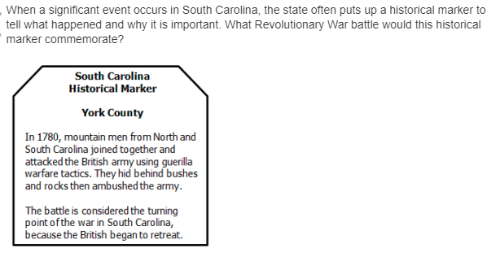 Responses
Responses- A Battle of CamdenBattle of Camden
- B Battle of Kings Mountain
- C Battle of CowpensBattle of Cowpens
- D Battle of Eutaw Springs
- B Battle of Kings Mountain
Question 7
Why did the French and Indian War lead to the conflict between the Cherokee and British colonists in South Carolina?
Responses
- A The Cherokee allied with the French who were enemies of British colonists
- B The land acquired in the war was divided unfairly between the Cherokee and the colonists.
- C The strain on economic resources led to raids on South Carolina farms by the Cherokee.
- D The Cherokee were angry that they were not protected by the British army during the war.
- B The land acquired in the war was divided unfairly between the Cherokee and the colonists.
Question 8
Which group of South Carolinians was most likely to be Loyalists during the American Revolutions?
Responses
- A
wealthy plantation owners
- B
merchants in Charles Town
- C
farmers in the Lowcountry
- D
residents of the Upcountry
- D
residents of the Upcountry
Not on paper

A Native AmericansNative Americans
B Women
C free African Americansfree African Americans
D Slaves
B Women
- Question: 22
A"It is better that ten guilty persons go free than one innocent suffer." - B"Government has no other end but the preservation of property.""
- C"Free people, remember this maxim: we may acquire liberty, but it is never recovered if it is once lost."
- D"I may not agree with what you have to say, but I'll defend to the death your right to say it. "
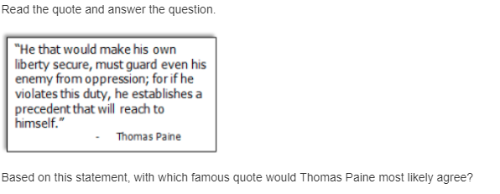
- C "Free people, remember this maxim: we may acquire liberty, but it is never recovered if it is once lost.""
Question 9
The Patriots supported...
The Loyalist supported...
Both Patriots and Loyalist lived in...
Separation from Great Britian
Remaining as a part of Great Britian
The American colonies
Quesiton 10
What was the relationship change between Native Americans and Europeans after the French and Indian War?
Responses
- A Europeans and Native Americans had a shift in political alliances
- B Europeans forced Native Americans to migrate out of tribal areas
- C Europeans had increased conflicts of territory for trade
- D Europeans enslaved Native Americans
- D Europeans enslaved Native Americans
Question 23
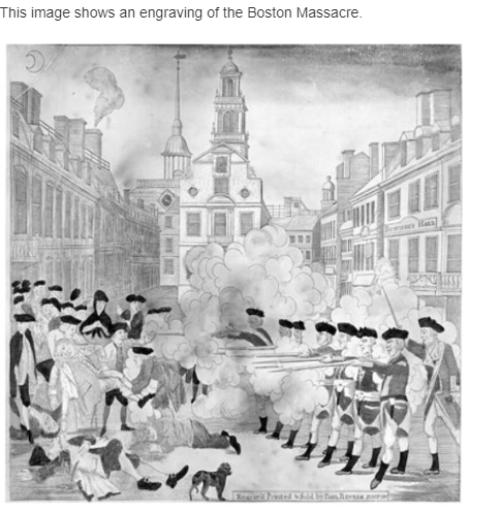
Based on this engraving, which viewpoint would the creator most likely have supported?
Responses
- AThe British soldiers were defending themselves from the violent mob of colonists.
- B The colonists were the victims of British soldiers abusing their authority.
- C The British government was justified in raising taxes to pay for the French and Indian War
- D The colonists were in a stronger position because they outnumbered the British soldiers
B The colonists were the victims of British soldiers abusing their authority.
Question 17
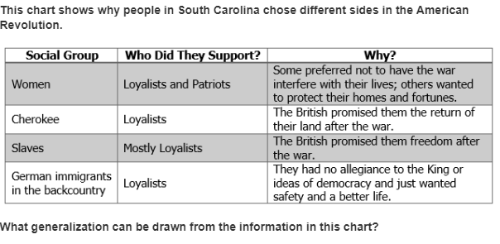
Responses
- A The ideals of the American Revolution were supported by all people in South Carolina
- B The decision of which side to choose in the American Revolution was driven by self-interest.
- C During the American Revolution, minority groups tended to support the Patriot cause
- D During the American Revolution, many people were persuaded to fight for a common set of values
- B The decision of which side to choose in the American Revolution was driven by self-interest.
Examine this map.
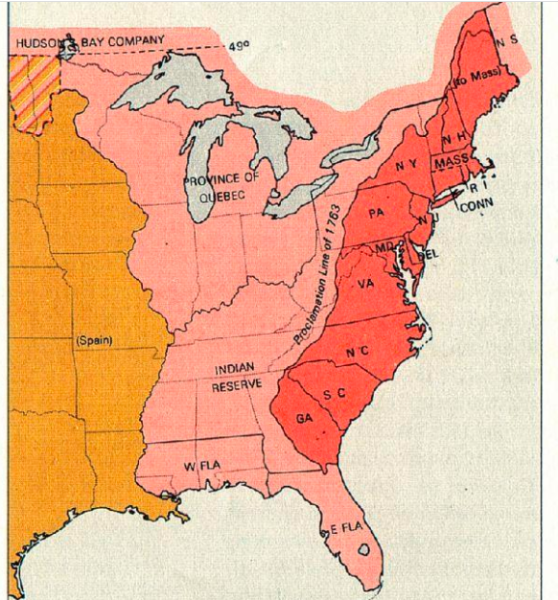
How did the information in this map impact the relationship between the colonists and Great Britain?
Responses
- A Tensions increased because colonists wanted to settle farther west, and Britain passed laws to prevent it.
- B Tensions increased because Britain failed to protect the colonists from attacks by Spanish settlers along the new border.
- C Tensions decreased as colonists were able to gain more land, and Britain collected more tax revenue.
- D Tensions decreased as Britain gave away free land to settlers willing to move farther west and start new colonies.
A Tensions increased because colonists wanted to settle farther west, and Britain passed laws to prevent it.
Which Patriot General was defeated and the majority of his troops retreated at the Battle of Camden?
General Horatio Gates
Which statement best explains how the outcome of the French and Indian War affected alliances between Native Americans and European powers?
Responses
- A Native American tribes became more loyal to the French because they won more battles during the war.
- B Native Americans maintained strong alliances with both the French and British after the war.
- C Many Native American tribes shifted or ended their alliances with European powers after feeling betrayed by British actions during and after the war.
- DNative American alliances with European powers remained unchanged because the war only affected colonial borders.
C Many Native American tribes shifted or ended their alliances with European powers after feeling betrayed by British actions during and after the war.
Question #9
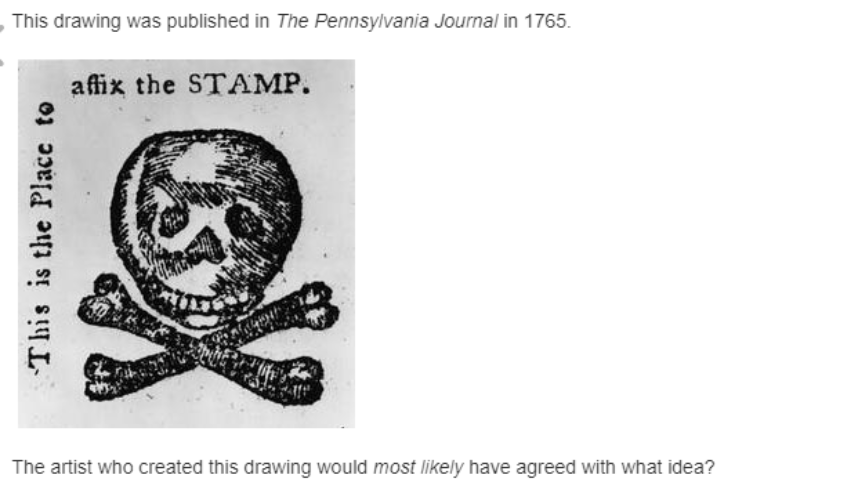 Responses
Responses- A The Sons of Liberty were wrong to organize the Boston Tea Party.
- B Colonists should boycott British goods to protest the Stamp Act.
- C British Parliament had the exclusive right to tax the colonists.
- D
Direct taxes were the best way for Britain to raise revenue.
- B Colonists should boycott British goods to protest the Stamp Act.
Which statement is true about the Upcountry and Lowcountry during and after the Revolutionary War?
Responses
- A They had large slave populations.They had large slave populations.
- B They relied on large landholdings to grow cash crops.
- CThey suffered social and economic damages due to the war.
- DThey were equally affected by the mercantilist policies of Great Britain.
- C They suffered social and economic damages due to the war..
Despite coming from different European nations, what motivation for coming to South Carolina did French, Spanish, and English explorers have in common?
Responses
- AThey wanted to establish permanent Catholic settlements.
- B They wanted to gain wealth and resources for their mother countries.
- C They wanted to establish plantations and grow cash crops.
- D They wanted to escape religious persecution in Europe.
- B They wanted to gain wealth and resources for their mother countries.
Which Battle was the last major battle of the Revoluntionary War?
The British surrendered and 7,000 British troops were also captured.
The Battle of Yorktown
Despite winning the French and Indian War, what negative effect did Great Britain suffer as a result of the war?
Responses
- A Most of the nation’s best generals died in the war.
- B The cost of the war left the nation with a significant amount of debt.
- C Angry Native American tribes continued to attack British colonies.
- D Colonial demand for British goods decreased.
- B The cost of the war left the nation with a significant amount of debt.
Why were many Upcountry residents opposed to the ratification of the United States Constitution?
Responses
- A They wanted it to include a clause that outlawed slavery.
- B They felt it did not give the federal government enough power to enforce laws.
- C They believed it gave too much power to state governments.
- D They were concerned it gave too much power to the wealthy elite.
- D They were concerned it gave too much power to the wealthy elite.
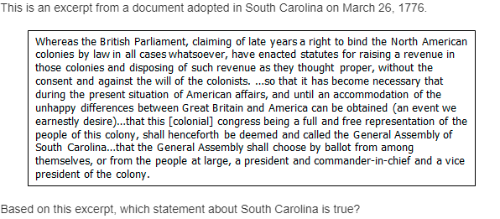
Responses
- A South Carolina declared its independence from Great Britain before any other colony.
- B South Carolina established a sovereign government before the Declaration of Independence was signed.
- C South Carolina refused to join with the other colonies to oppose the actions of the British government.
- D South Carolina was reluctant to oppose Parliament and continued to have a royal governor.
B South Carolina established a sovereign government before the Declaration of Independence was signed.